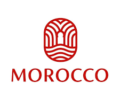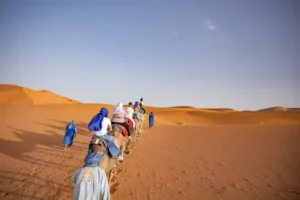TRAVEL TIPS
BEST TIME TO VISIT MOROCCO BY MONTH
January
Best for: cooler weather, small crowds, camping in the Sahara and Yennayer
Not a fan of the heat? January is the coolest and wettest month with daytime highs of 10-20°C, though it’s chillier in the mountains and warmer in the desert. The Sahara sees higher foot (read: camel) traffic due to more manageable daytime temps, while the rest of Morocco is usually crowd-free so you’ll have the sites and souks (almost) all to yourself.
If you time it well, you might experience Yennayer (Amazigh New Year), celebrated by traditional Berber communities in North Africa Festivities can get pretty lively in the High Atlas with communal feasts, dancing and singing to honour the connection between the Amazigh and nature, and to call in abundant crops and prosperity for the year ahead.
February
Best for: cooler weather, trekking Mt Toubkal and Blossom Festival
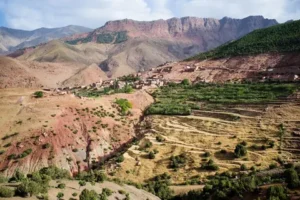
There’s less rain in February and temperatures increase slightly. Queues at popular sites are minimal and you’ll have more opportunities to banter with locals. The weather is near perfect for hiking and camel rides in the desert. Or, if you prefer snow over sand, head to the High Atlas to experience wintery magic of mountains, the highest peak in North Africa.
If you’re around in mid-February, consider visiting the quaint village of Tafraout in the Souss-Massa region for the annual Almond Blossom Festival. Expect delicious food, traditional Berber folk music and, of course, heaps of sweet-smelling almond blossoms.
March
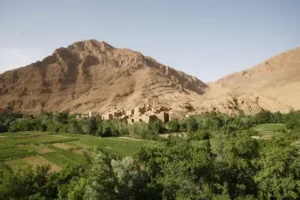
Best for: lush landscapes, hiking and the International Nomad Festival
Hello, spring! March is a gorgeous month with budding flowers and lush vegetation thanks to the winter rains. Foot traffic picks up, but the weather is great for exploring iconic landmarks and getting lost in the winding streets of Marrakesh, Fes and Chefchaouen. Daytime temps climb into the low 20s, but layers are still required for the evening.
You could also align your trip with the International Nomad Festival in the remote Saharan village of M’Hamid El Ghizlane. It’s a wonderful opportunity to learn about the culture and customs of nomadic tribes from the region.
April
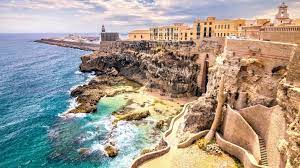
Best for: warmer weather, spring blooms, hiking and the Sufi Festival
Spring’s in full swing by April with rising temps and longer days. There’s usually a rush of tourists around the Easter holidays, so keep this in mind if there’s somewhere in particular you want to stay as you may need to book in advance. Hiking in the Middle and High Atlas is a delight with blooming flora set against snow-topped peaks.
Be sure to check out the Sufi Festival if you’re around Fes, the cultural capital of Morocco. Sufism is an esoteric form of Islam that promotes mysticism, introspection and divine love. You’ll be able to witness Sufi devotees from around the world perform rituals, chanting, poetry and concerts in amazing venues across the city.
May
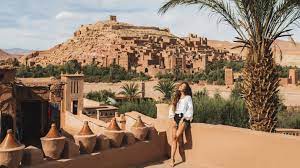
Best for: pleasant weather, trekking and the Festival of the Roses
May’s hot but not sweltering weather makes it a popular month, so it’s best to book your activities and accommodation in advance. It’s one of the best months to go trekking, and it’s the last month to venture into the Sahara or explore bustling cities like Marrakesh before the intense heat arrives.
If you visit M’Goun Valley (AKA, Valley of the Roses) in early May, you can see and smell beds of sweet Damascus roses as far as the eye can see. Pickers then pluck tonnes of petals for rose water and oil production – a key ingredient in Arab culture. Festival of the Roses coincides with the end of the harvest season and is a fantastic cultural experience.
June
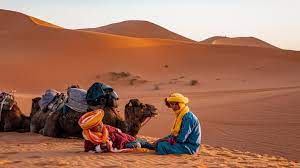
Best for: enjoying the coast, cultural music festivals and the Cherry Festival
June marks the start of the summer (and the notorious heat), though it’s slightly cooler than July and August. The weather is prime for enjoying fresh seafood in Casablanca or kicking back on the beaches of Essaouira.
The festival calendar is jam-packed with musical goodness, including Essaouira’s Gnaoua Music Festival and Fes’s Festival of World Sacred Music. There’s also the Cherry Festival in Sefrou which features elaborate floats and parades, authentic Moroccan food and the crowning of ‘Miss Cherry’.
July
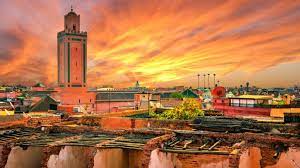
Best for: enjoying the coast, Jazzablanca and balmy evenings
Temperatures soar in June, often topping 40°C. But it’s totally doable if you can cope with the heat (and remember to use sunscreen and stay hydrated!). It’s hotter the further inland you go – crowded cities like Marrakesh can feel stifling – so it’s the perfect excuse to head to Essaouira, Rabat or Tangier where the salty sea breeze cools things down.
Casablanca also hosts the annual Jazzablanca festival featuring soul, funk, new age and jazz music. Despite the heat, July is a reasonably popular month due to European summer breakers, so be sure to pre-book any activities on your bucket list.
August

Best for: balmy evenings, hitting the beach, Todra Gorge and Dades River
August is hot with a capital H. Beat the heat along the Atlantic or Mediterranean coastlines, or at Todra Gorge and Dades River where you can cool down in limestone river canyons. It’s best to start the day early and take refuge from the midday sun in museums, cafes or hammams. Days are quieter, but evenings come alive as locals fill the streets to eat and make the most of the cooler temps.
September
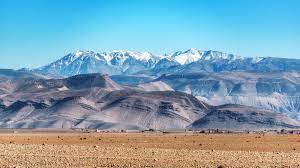
Best for: comfortable weather, the whole gamut of activities and Imilchil Marriage Festival
September is one of the best months to visit in terms of weather. The scorching heat subsides, sunshine is plentiful and the rush of summer holidaymakers comes to a halt. Aside from the Sahara which can still be oppressively hot, September offers prime conditions for trekking, swimming and exploring historical sites.
You could also head to the Middle Atlas to experience a side of Morocco most travellers don’t see at the Imilchil Marriage Festival. This annual event sees hundreds of Berber people gather in elaborate outfits to find their perfect spouse.
October
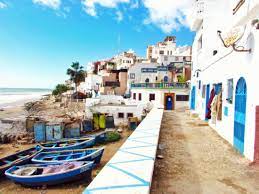
Best for: harvest season festivities, mild weather and Sahara adventures
Pleasant weather continues into October, and while the rain starts falling in the Middle Atlas mid-month, it’s usually not enough to disrupt hiking. It can get windy along the coast, so head inland to Fes, Marrakech and Chefchaouen to immerse yourself in the colour, chaos and charisma of Morocco sans the heat.
If you have a sweet tooth, you’ll love October as it’s date season! It’s a great time to experience traditional harvesting festivities and, of course, get your fill of Mother Nature’s caramels.
November
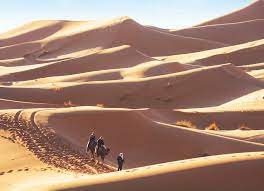
Best for: the Sahara, exploring the cities and cosying up in cafes
Things pick up again in the Sahara (but remember your warm layers!). Yes, it’s busier, but it’s worth it for more bearable temps. On the flip side, Morocco’s cities see lower foot traffic in November, making it a great time to tick off the highlights. The cooler weather is the perfect excuse to cosy up in cafes with mint tea and a plate of warm Moroccan pastries. Or go all out on the food on tagine harissa and causcus filled adventure from Casablanca to Marrakesh.
December
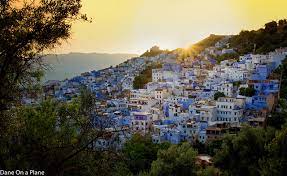
Best for: winter trekking, cultural activities and Sahara adventures
For most of December, you’ll enjoy a crowd-free Morocco – excluding late-December which sees a spike in festive holidaymakers. It’s not quite bathing suit weather along the coast, but sun-seekers can visit the Sahara where clear skies and sunshine await. Mild daytime temps inland also make for excellent hiking conditions at lower altitudes like Todra Gorge (without sweating buckets).
If you want to embrace the wintry weather, you could go on a snow-crunching trek in the High Atlas to Mt Toubkal with a trusty pack of mules and an expert crew to lead the way.
TRAVEL ESSENTIALS
Documents
- Visas – if needed for the trip
- Passport
- Vaccination records
- Flight tickets or e-ticket
- Voucher for trip confirmation
- Travel insurance – insurer details, policy number and your emergency contact number (24 hours). All this applies even if you’re traveling via credit card insurance
- Country information including the most recent trip notes
- International driving license – in case you plan on hiring a car
- Driving license
- Seniors card – availing travel discounts
- Spare set of passport photos
- Photocopies of vital documents – keep these separately (one at home and a copy emailed to yourself)
Luggage
On most trips, you end up carrying your own luggage, though you probably won’t be walking long distances carrying it – likely less than 30 minutes. A lot of travelers conveniently carry their luggage in a backpack. An overnight bag sporting a shoulder strap is also ideal for light traveling.
Backpacks with wheels or smaller bags are also great, particularly if they have carry straps. Consider carrying a daypack for water and a camera. The list includes:
- Padlocks and keys
- Daypack / small backpack
- Soft luggage, bag with wheels and straps or backpack
Clothing
On trips, particularly long ones, pack clothes that are easy to wash and dry up fast. Women ought to pack skirts that cover the knees completely, while packing scarves for visiting places of worship such as churches or mosques.
Military or ex-military style clothing and equipment is strictly not recommended in a lot of areas. Pack a couple of fancier clothes for those nights out. The list includes:
- Jeans, shorts or trousers
- Practical walking shoes
- T-shirts and cotton shirts
- Socks and underwear
- Washing line – if you are going rustic
- Washing detergent (Bio-degradable)
- Long trousers
- Sweater, warm anorak or microfleece
- Swimming Suit
- Dress Clothes – for nice restaurants.
Personal Health and Hygiene
- Contact lenses and solution
- Sunglasses
- Insect repellant
- Lip salve or lip balm
- Feminine hygiene products
- Sunscreen – high protection, rated over 25 (it can sometimes be difficult or expensive to find sunscreen in Morocco)
- Prescription glasses
- Personal prescriptions or medication
- Hat or wide brim hat
- After-sun moisturizer
- Paracetamol and/or aspirin
- Travel sickness tablets
- First aid kit
- Anti-diarrhea pills – always consult your doctor beforehand
Electronics / Cameras
- Camera
- Extra Batteries
- Phone
- Phone Charger
- Adapters for world plugs
- All cords
For Your Cash / Money
- Trip Kitty; in cash
- Pouch or money belt
- Money, in the form of cash or credit cards
Going Camping?
- Travel pillow
- Inner sleep sheet
- Head torch or lamp
- Personal mattress or thermarest
- Warm sleeping bag that accommodates you well for at least 3 of the 4 seasons.
- Ground sheet/polythene sheet; if you prefer sleeping under the open sky
For Wet / Rainy Weather Conditions
- Small umbrella
- Waterproof bags ; rain protection while walking
- Waterproof trousers
- Rain coat
- Windproof and waterproof jacket
Slumber / Sleep Gear
- Eye mask
- Ear plugs
- Night clothes or sleepwear
Personal Items
- Bathing towel
- Small mirror
- Toiletries
- Shaving equipment
- Mobile phone; make sure you have international roaming access
- Small sewing kit including safety pins
LOCAL ETIQUETTE
Morocco is a conservative country and you should always dress modestly when travelling here. Men should wear a t-shirt or collared shirt covering the shoulders and long trousers or shorts that reach the knee. Women should wear long, loose-fitting clothing that covers your upper arms, knees, chest, midriff and back. It’s not necessary for foreign women to cover their hair, but you will need to do so when visiting a mosque, so bring a scarf for extra modesty. Swimwear should only be worn at the beach and you should always cover up before leaving the beach.
If you are visiting a rural area, it’s important to be even more conservative and cover your arms and legs. The cities are a bit more relaxed but the locals appreciate it if you respect the Moroccan culture by dressing modestly. As for shoes, bring some comfy sandals, as you’ll find yourself slipping them off quite a lot when you enter homes and religious sites.
Remember, if you’re visiting during Ramadan, you should dress even more conservatively. Also, you won’t be expected to fast, but it is polite to eat, drink and smoke indoors away from the locals who are fasting during this holy month.
Public displays of affection
While you may often see people of the same sex hugging and holding hands in Morocco, this is only a sign of friendship. Public displays of affection between opposite sexes such as kissing are not allowed, while homosexuality is illegal in Morocco.
Gestures
If you need to beckon someone, don’t use your index finger to motion a person over, as this is considered very rude in Moroccan culture. Instead, place your palm downward and sweep the hand toward yourself.
Domestic etiquette in Morocco
Moroccans are famously friendly and you might even meet people who invite you to their homes for a meal. When you travel to Morocco with Trafalgar, you’ll also get the unique opportunity to enjoy meals with local families in their homes. So what should you know about Moroccan culture in the home?
The first thing to do is to remove your shoes before entering. Your host will offer you indoor slippers or you can go barefoot. It is then polite to chat with your host before they offer you tea or coffee and sweets. It’s also a Moroccan tradition to bring a gift for the host like pastries or tea.
Table etiquette in Morocco
Before the meal, you should always wash your hands. Your host might even bring a washing basin to the table before the meal is served. But don’t dig in just yet! You shouldn’t start eating until the host blesses the food and says “bismillah”, meaning “in the name of God”. When you begin the feast, always remember to use your right hand for eating.
Moroccans often use their hands to eat, rather than a knife and fork, but there’s a trick to it. You should hold the bread between your fingers and use your thumb as a scoop… Practice a bit and you’ll be a pro in no time! Moroccan food is delicious and it can be tempting to want to try everything on the table. But if you’re eating from a communal plate in a home, you should only take what is immediately in front of you, unless you’re offered something by the host.
Don’t criticise the Moroccan monarchy
Morocco has lèse–majesté laws which means it’s illegal to criticise, mock or speak badly about the Moroccan king and the royal family. Defacing the king’s image is also illegal, and breaking these laws could actually land you in jail, so keep your royal opinions to yourself in Morocco.
Don’t disrespect Islam
Another big no-no is criticising Islam. More than 99 percent of moroccan population is muslim and Islam is the state religion of Morocco. If you disrespect Islam here, you risk offending the locals, and no traveller should go out of their way to be rude to their host. While it’s fine to ask questions in a genuine attempt to learn more about the religion, you should avoid sharing any controversial opinions that may upset the locals.
Also remember that non-Muslims are forbidden from entering certain areas like shrines, mosques, graveyards and koubas (tombs of marabouts or local saints). Even if you’re near a mosque, you should be very respectful and never get too close or look inside, especially if you’re taking a photo. The main exception to this rule is the famous Hassan II Mosque in Casablanca and it’s a wonderful experience to see the intricate Islamic architecture up close here.
